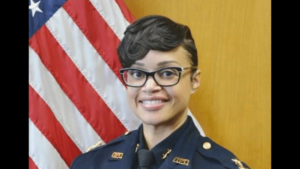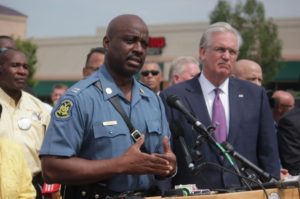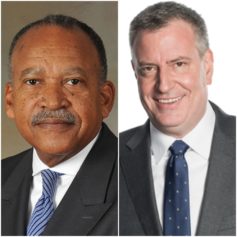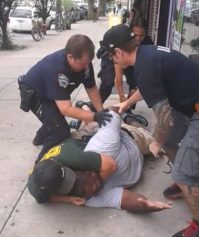
Danielle Outlaw was announced on August 7 as the first African-American female chief of the Portland police department.
Former Oakland, California, deputy police chief Danielle Outlaw made history this summer being selected as the new chief of the Portland, Oregon, police department. She’s the first African-American female to hold the position. Portland’s KGW reports Mayor Ted Weever’s decision to hire Outlaw was predicated on their shared “dedication to improving relationships with Portland’s communities of color” and “increasing diversity and embracing equity.”
Outlaw’s appointment extends a recent trend of Black police officers being hired for top leadership positions in police departments across the country. Following the 2014 shooting death of Ferguson, Missouri’s Michael Brown Jr. and the accompanying months of civil unrest, Florida’s Delrish Moss was chosen as Ferguson’s first Black police chief. Similarly, San Francisco’s police department endured relentless public skewering after officers were caught swapping racist text messages. The outrage peaked in May of 2016 when a San Francisco sergeant shot and killed an unarmed Black female, 29-year-old Jessica Williams. Her shooting death prompted the removal of then-chief Greg Suhr and the later appointment of former Los Angeles deputy chief William Scott, a Black male.
More than fifty years ago, revolutionary philosopher and author Frantz Fanon recognized that the complexion of how Black bodies are policed can be modified, and Black people can be “made to feel that things are changing.” But after the public relations theater of selecting the first Black police chief, Black residents enjoy no peace of mind when contacted by armed lawmen. There is no reason to believe Brown or Williams would be alive if chiefs Moss and Scott had been hired sooner.
Korean War Veteran and author Neely Fuller Jr. speculates that these ballyhooed hirings could be the latest example of the racist tactic of “confusion by illusion.” In his recently revised textbook on racism, Fuller writes that this strategy “often proves to be very effective in causing many non-white people to believe that [whites] have little or no power.” The latest podium appearance featuring Ferguson’s Chief Moss can falsely convey that Black residents are no longer a violated underclass subject to racist dominion in Michael Brown’s town.
Recent history corroborates much of Fuller’s analysis. This summer is also the three-year anniversary of the New York Police choking Eric Garner to death. The white officer who strangled Garner, Daniel Pantaleo, was never indicted. However, according to The New York Times, Kizzy Adonis, a Black female NYPD sergeant and a supervisor in 2014, is the only officer at the scene of Garner’s death to face “accusations of misconduct.” She’s charged with four counts of “failure to supervise,” as though this Black female overseer was the most powerful person on the scene and culpable for Garner’s asphyxiation.

Missouri Highway Patrolman Ron Johnson during the 2014 unrest in Ferguson, Missouri.
In the summer of 2014, Missouri Highway Patrol Captain Ron Johnson received nearly as much airtime as Garner’s final breath. During an August saturated with tear gas and armed standoffs, Captain Johnson, a Black male, became a symbol of mediation. A year after the Ferguson unrest, journalist John Hockenberry said Johnson “was appointed as an impromptu mediator” and “a civic leader.” These honorary designations and the television segments won Johnson legions of admirers and detractors, but did not give him the power to help secure a trial for the murder of an unarmed Black teen.
To be clear, Johnson’s motives, and the motives of any other Black enforcement official, for joining law enforcement are not in question. Generations of Black males and females have labored and sacrificed to don a badge as a way of fighting racism. After taking the Ferguson job, Chief Moss disclosed that racist cops called him the n-word and assaulted him when he was younger. Echoing the sentiments of huge numbers Black officers, Moss told NPR, “I decided that I needed to become a police officer so that I could provide better services to my community.”
Fuller refuses to condemn such a noble intent and never discourages Black people from becoming officers. In fact, he ventures that police and fire departments will be aggressively recruiting more Black people to join their ranks. His recommendation is that Black officers and citizens alike understand these hirings do not represent the wane of white power or a drop-off in anti-Black police thuggery.
A concern highlighted during the Ferguson turmoil was the lack of organized data regarding lethal police encounters, evidence to help quantify the scope of police terrorism. Indiana University Bloomington political science professor Sean Nicholson-Crotty sifted data to see if hiring Black officers helps reduce lethal police encounters with Black people. Although we’ve been encouraged to believe that the hiring of Black officers will improve the policing of Black citizens, Nicholson-Crotty concludes, “For the vast majority of cities, simply increasing the percentage of Black officers is not an effective solution.” After examining fatal police shootings in the 100 largest U.S. cities, data suggests that anything short of 35 to 40 percent of officers being Black will have no impact. Nicholson-Grotty added that such a robust number of Black lawmen is impossible in most North American cities.
Ferguson had four Black officers at the time of Michael Brown Jr.’s death. Now, counting Chief Moss, they have ten. Three years later, Ferguson citizen Donald Harry submits Black residents are still without sanctuary. “What good does it do to have, say, a Black police chief and more Black officers in the police department, when… [police have] lost touch with the community?” asked Harry.
Fuller encourages Black people to have no questions or illusions. The transfusion of melanin into the highest ranks of policing will not dilute or disturb a police empire forged from centuries of anti-Black violence.
Gus T. Renegade hosts “The Context of White Supremacy” radio program, a platform designed to dissect and counter racism. For nearly a decade, he has interviewed and studied authors, filmmakers and scholars from around the globe.

